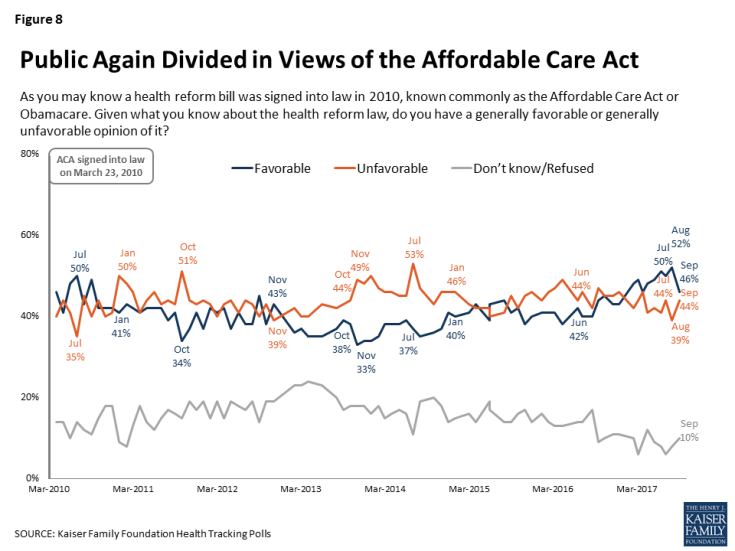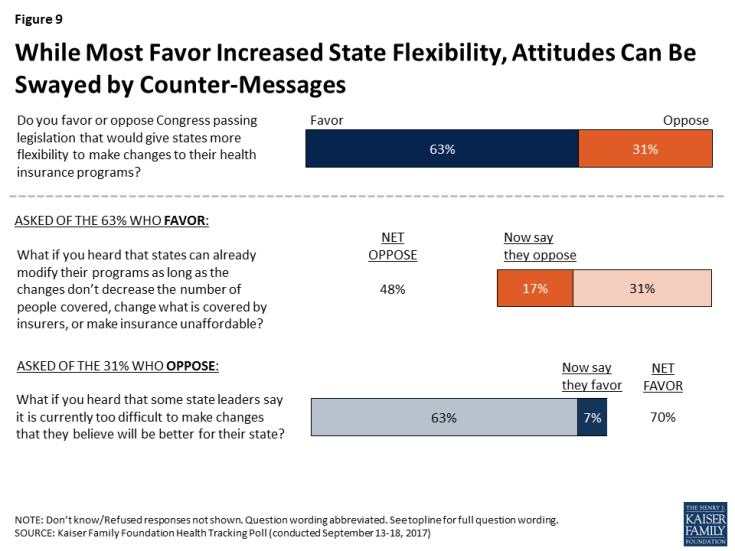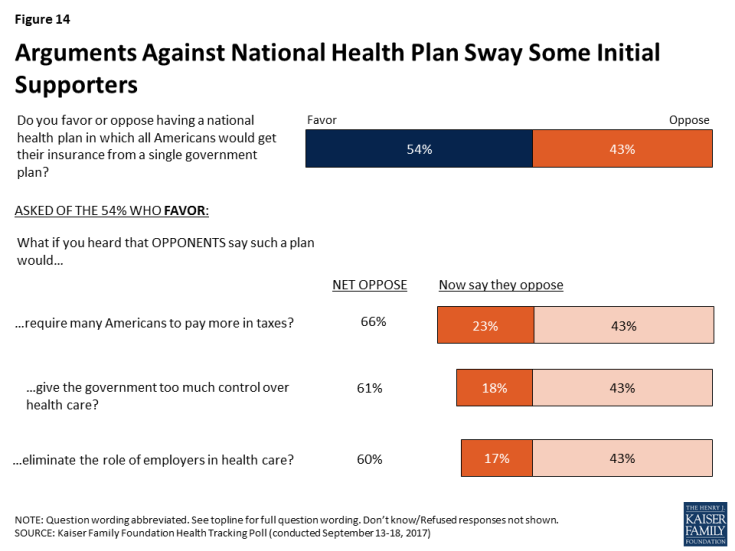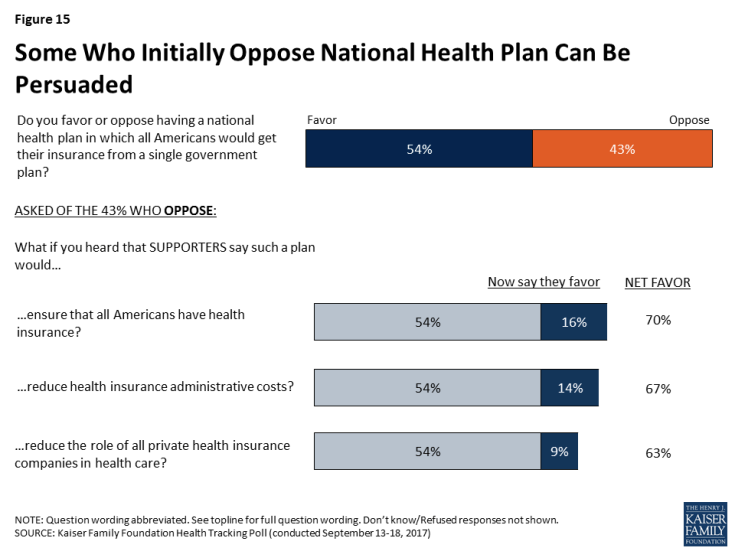Kaiser Health Tracking Poll - September 2017: What's Next for Health Care?
KEY FINDINGS:
- The September Kaiser Health Tracking Poll, fielded largely prior to the most recent Republican effort to repeal the 2010 health care law, finds three-fourths of the public saying it is important for Congress to work on reauthorizing funding for the State Children’s Health Insurance Program (CHIP), which provides health care coverage for uninsured children. Democrats prioritize reauthorizing CHIP funding and stabilizing the ACA marketplaces, with at least eight in ten saying each is an important priority for Congress to work on now. These are also the highest-ranking priorities among independents, with about seven in ten saying the same about both reauthorizing CHIP and stabilizing the marketplaces. Republicans, on the other hand, are more likely to prioritize continuing efforts to repeal and replace the ACA, with 71 percent saying that is important for Congress to do now.
- In general, Republicans are more likely to want Republicans in Congress to focus on repeal efforts than on improving the way the Affordable Care Act (ACA) is working (66 percent v. 28 percent), while most Democrats want Democrats in Congress to focus on improving the way the ACA is working (52 percent) rather than trying to pass a national health care plan (43 percent). A majority of independents want Democrats and Republicans in Congress to focus their efforts on improving the way the ACA is working rather than focusing on either a national health care plan or repealing the ACA.
- Half of the public thinks the ACA marketplaces are “collapsing.” One proposed step Congress could take to stabilize the markets and control costs for people who purchase their own plans is to guarantee cost-sharing reduction (CSR) payments to insurance companies. The Trump Administration has said they may stop making these payments, which has led to insurance companies saying they may raise premiums or stop participating in the marketplaces. Two-thirds of the public – including majorities of Democrats and independents – say Congress should guarantee the CSR payments in order to help stabilize the insurance market while about three in ten of the overall public and about half of Republicans (53 percent) say these payments constitute bailouts to the insurance companies and should be stopped. Overall, about seven in ten Americans are not confident that President Trump and Congress will be able to work together to make improvements to the ACA marketplaces.
- Overall views of the ACA are once again divided, with 46 percent expressing a favorable view and 44 percent expressing an unfavorable view. While overall favorability increased over the past year, this month finds a return to a divided public that characterizes most of the last seven years.
- This month’s Kaiser Health Tracking Poll examines public support for a variety of competing health care policies aimed at improving or replacing the 2010 health care law, including plans to allow people to “buy in” to Medicaid or Medicare.
After the Senate failed to pass a bill to repeal parts of the 2010 Affordable Care Act (ACA) in late-July, some lawmakers have turned their attention to various competing national health policy issues, including efforts to stabilize the ACA marketplaces, proposals to create a single-payer health care system, and the reauthorization of funding for the State Children’s Health Insurance Program (CHIP), while some have continued to focus on repealing and replacing the ACA. This month’s Kaiser Health Tracking Poll examines how Americans are prioritizing the competing health care issues as well as their attitudes toward possible changes to the current health care system.
What Should Congress Work on Now?
Congress has a number of competing priorities for the month of September, and when asked about several of the issues they may address this month, a large majority of the public see reauthorizing funding for CHIP and passing legislation to stabilize the ACA marketplaces as important priorities for Congress to work on now. Specifically, three-fourths of the public (75 percent) say it is “extremely” or “very” important for Congress to work on reauthorizing funding for CHIP, the program which provides health care coverage for uninsured children. This is followed by seven in ten (69 percent) who say the same about passing legislation to stabilize the ACA marketplaces in order to minimize premium increases and encourage more insurers to offer health plans. Fewer, but still about half, say it is “extremely” or “very” important for Congress to work on reforming the tax code, which may cut taxes for some individuals (49 percent), or work on continuing efforts to repeal and replace the 2010 health care law (47 percent).
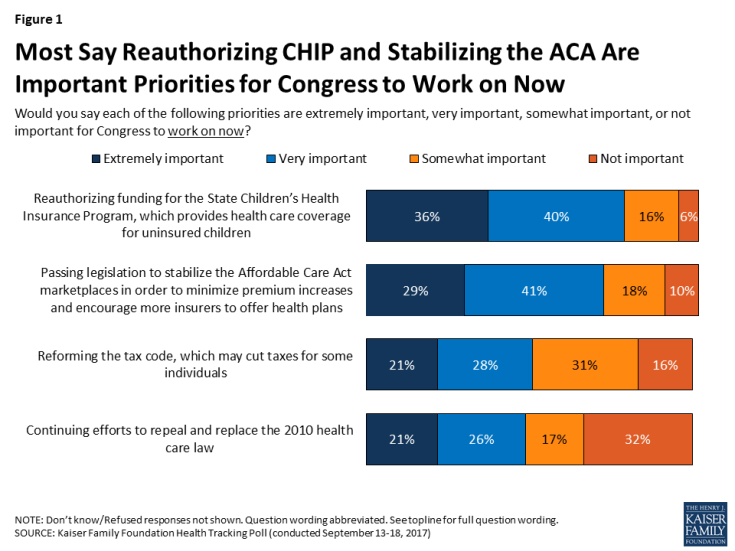
Figure 1: Most Say Reauthorizing CHIP and Stabilizing the ACA Are Important Priorities for Congress to Work on Now
Priorities Vary by Party, With More Republicans Focused on ACA Repeal and More Democrats and Independents Prioritizing CHIP Funding and ACA Stabilization
Not surprisingly, most Democrats prioritize reauthorizing CHIP funding and stabilizing the ACA marketplaces, with at least eight in ten saying each is an important priority for Congress to work on now. These are also the highest-ranking priorities among independents, with about seven in ten saying the same about both reauthorizing CHIP and stabilizing the marketplaces. Republicans, on the other hand, are more likely than Democrats and independents to prioritize continuing efforts to repeal and replace the ACA, with 71 percent saying that is important for Congress to do now. Still, many Republicans say it is important for Congress to now work on reforming the tax code (63 percent), reauthorizing CHIP funding (62 percent), and stabilizing the ACA marketplaces (57 percent).
| Table 1: What Should Congress Work on Now? | ||||
|
Percent who say each of the following is extremely or very important for Congress to work on now: |
Total | Democrats | Independents | Republicans |
| Reauthorizing funding for the State Children’s Health Insurance Program | 75% | 89% | 72% | 62% |
| Passing legislation to stabilize the Affordable Care Act marketplaces | 69 | 81 | 72 | 57 |
| Reforming the tax code, which may cut taxes for some individuals | 49 | 38 | 50 | 63 |
| Continuing efforts to repeal and replace the 2010 health care law | 47 | 28 | 47 | 71 |
| Note. Question wording modified. See topline for full question wording. | ||||
Improving the ACA v. Competing Health Care Plans
With debate about whether lawmakers should pursue a bill to stabilize the ACA, repeal and replace it, or aim for a single-payer health system, this month’s Kaiser Health Tracking Poll asked generally whether the public thinks the members of their party should focus their efforts on improving the way the ACA is working or focus their efforts towards other recent proposals. Republicans are more likely to want Republicans in Congress to focus on repeal efforts than on improving the way the ACA is working (66 percent v. 28 percent), while most Democrats want Democrats in Congress to focus on improving the way the ACA is working (52 percent) rather than trying to pass a national health care plan (43 percent).
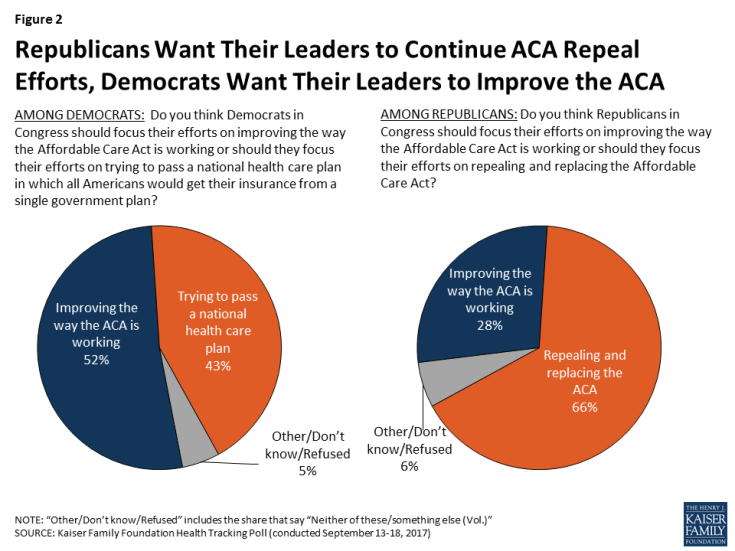
Figure 2: Republicans Want Their Leaders to Continue ACA Repeal Efforts, Democrats Want Their Leaders to Improve the ACA
Most independents want both Democrats and Republicans in Congress to focus their efforts on improving the way the ACA is working rather than focusing on either a national health care plan or repealing the ACA.
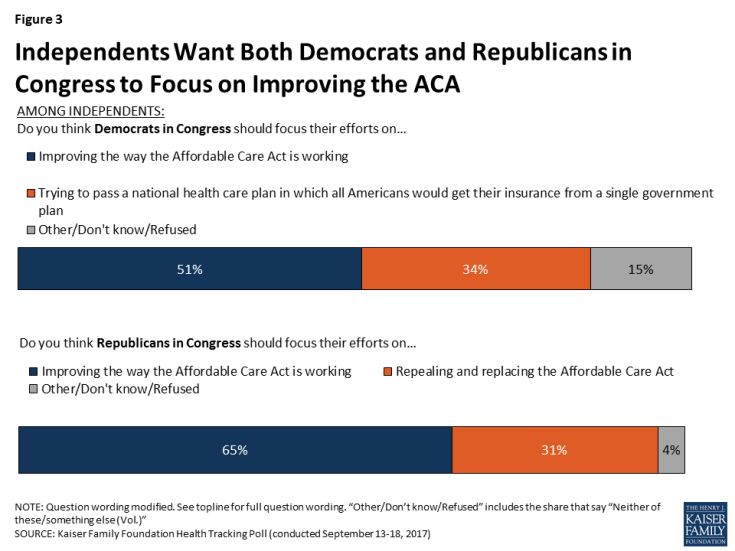
Figure 3: Independents Want Both Democrats and Republicans in Congress to Focus on Improving the ACA
Uncertainty over the Future of the ACA Marketplaces
Currently about 10.3 million people have health insurance purchased through the ACA marketplaces or exchanges, where people who don’t get coverage through their employers can shop for insurance and compare prices and benefits.1 This month’s findings indicate that most Americans think the ACA marketplaces are facing significant issues and while they favor Congress taking actions to stabilize the marketplaces, they are not confident that President Trump and Congress will be able to work together to make improvements to the marketplaces.
Half of the Public Thinks the ACA Marketplaces are Collapsing
While most experts maintain that the ACA marketplaces are not collapsing,2 much of the public holds a different view. Half of the public say the marketplaces are collapsing, while about one-third say they are not collapsing (35 percent) and an additional 14 percent say they “don’t know.” The majority of Republicans (62 percent) and independents (53 percent) say the marketplaces are collapsing, as do four in ten Democrats (38 percent).
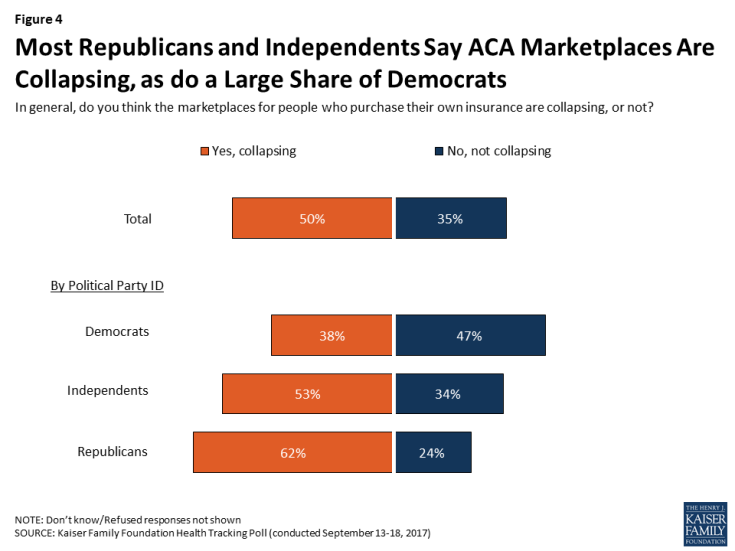
Figure 4: Most Republicans and Independents Say ACA Marketplaces Are Collapsing, as do a Large Share of Democrats
Congressional Efforts to Stabilize the Marketplaces
For the past several weeks, the Senate Committee on Health, Education, Labor, and Pensions has held hearings on how to stabilize the ACA marketplaces or exchanges. One proposed step Congress could take to stabilize the markets and control costs for people who purchase their plans on their own is to guarantee payments to insurance companies that help cover the cost of deductibles and copayments for lower-income Americans (known commonly as ‘cost-sharing reduction (CSR) payments). The Trump Administration has said they may stop making these payments, which has led to insurance companies saying they may raise premiums or stop participating in the marketplaces. When asked what Congress should do, two-thirds of the public say Congress should guarantee the CSR payments in order to help stabilize the insurance market while three in ten (28 percent) say these payments constitute bailouts to the insurance companies and should be stopped. While the majority of Democrats (90 percent) and independents (63 percent) say Congress should guarantee the CSR payments, about half of Republicans (53 percent) say the payments should be stopped.
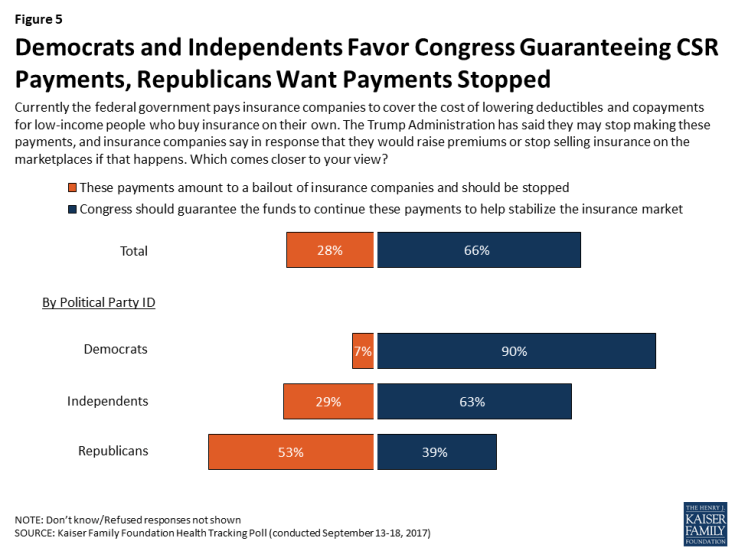
Figure 5: Democrats and Independents Favor Congress Guaranteeing CSR Payments, Republicans Want Payments Stopped
Public confidence that President Trump and Congress will be able to work together to make improvements to the ACA marketplaces is low, with about seven in ten Americans saying they are either “not too confident” (28 percent) or “not at all confident” (42 percent) while three in ten say they are “very confident” (8 percent) or “somewhat confident” (22 percent) that they will be able to work together. Most Republicans (55 percent) are confident that President Trump and Congress will be able to work together while most Democrats and independents are not confident (85 percent and 70 percent, respectively).
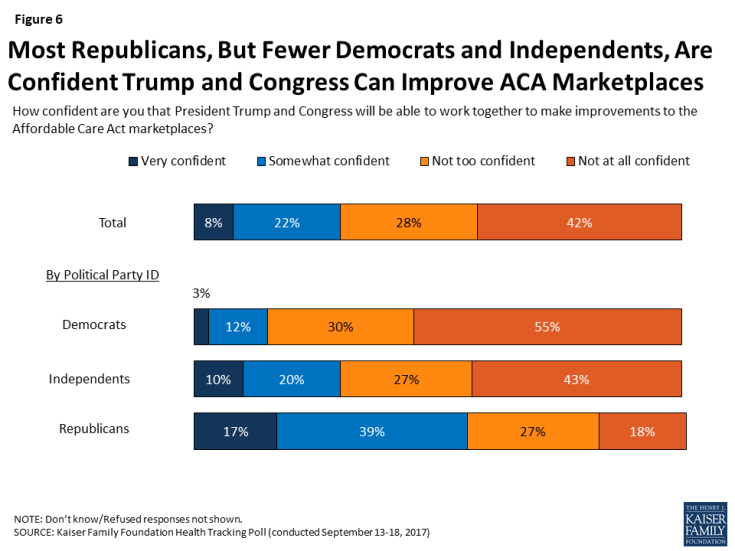
Figure 6: Most Republicans, But Fewer Democrats and Independents, Are Confident Trump and Congress Can Improve ACA Marketplaces
The Trump Administration’s Role in the Stability of the ACA Marketplaces
Four in ten of the public (41 percent) say the actions taken by President Trump and his administration are generally “hurting” the way the marketplaces are working while one-third (34 percent) say their actions are “not having much impact;” fewer, one in five, say their actions are “helping” the ACA marketplaces. These responses are largely driven by party, with almost half of Republicans (46 percent) saying the Trump administration’s actions are “helping,” while seven in ten Democrats (69 percent) say their actions are “hurting.” Independents are more divided, with similar shares saying the Trump administration’s actions are “not having much impact” (39 percent) or “hurting” (38 percent), while fewer say their actions are “helping” (19 percent).
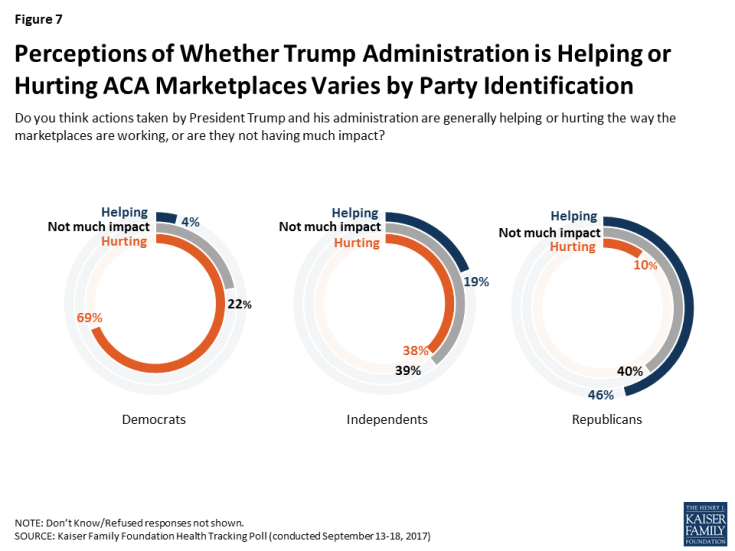
Figure 7: Perceptions of Whether Trump Administration is Helping or Hurting ACA Marketplaces Varies by Party Identification
ACA Favorability
With the ongoing debates over the future of the ACA and stability of the individual marketplaces, this month’s poll finds 46 percent of the public has a favorable view of the ACA and 44 percent has an unfavorable view. While the overall favorability has increased gradually over the past year, this month finds a decrease in favorability since last month (down six percentage points from 52 percent in August) and a return to a divided public that characterizes most of the last seven years. In fact, the decline in favorability is across all groups including Democrats, independents, and Republicans.3
Attitudes to Recent Proposed Changes to the Current Health Care System
During the past few weeks, Congressional members of both political parties have announced plans to reform the current health care system. This month’s tracking poll examines the public’s attitude toward some of these proposed changes.
Increasing State Flexibility in Health Care
As part of the ongoing discussions about the future of the 2010 health care law, several Republican in Congress have proposed changes that would increase the role of states in running their own health insurance programs. Enhancing state flexibility is a key feature in proposals to stabilize the ACA marketplaces.
The majority of the public (63 percent) favor the broad idea of Congress passing legislation that would give states more flexibility to make changes to their health insurance programs while about three in ten (31 percent) oppose this. However, some of these attitudes can be swayed upon hearing counter-messages.
When those who initially say they favor giving states more flexibility hear that states can already modify their programs as long as the changes don’t decrease the number of people with insurance, change what is covered by insurers, or make insurance unaffordable, about one-fourth (17 percent of the public overall) change their view and now oppose Congress passing such legislation, resulting in about half (48 percent) of the overall public opposed. On the other hand, one-fifth of those initially opposed to the legislation (7 percent of the public overall) change their mind after hearing that some state leaders say it is currently too difficult for them to make changes that they believe are better for their state, increasing overall support to 70 percent.
Letting Individuals “Buy Into” Medicaid
The public has favorable views of the Medicaid program,4 and some lawmakers are suggesting that one way to help ensure that uninsured individuals and those who purchase their own insurance, including lower-income individuals who receive help from the government to pay their premiums, have sufficient options for health insurance is to let them buy into Medicaid, the government health insurance program for low-income adults and children. Although it is unclear where opinions may land after this idea becomes publicly debated, this month’s poll finds a majority of the public (66 percent) – including most Democrats (79 percent) and independents (72 percent) – favor letting people use government subsidies to buy health insurance through state Medicaid programs instead of purchasing a private insurance plan through the marketplace. Republicans are more divided with about half (49 percent) saying they oppose and four in ten (39 percent) saying they favor such a plan.
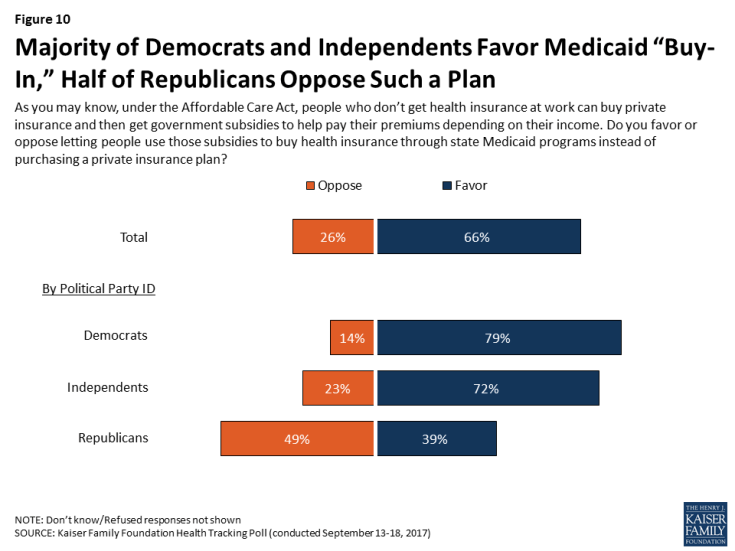
Figure 10: Majority of Democrats and Independents Favor Medicaid “Buy-In,” Half of Republicans Oppose Such a Plan
Letting Younger People “Buy Into” Medicare
Another proposal being put forth by Democratic lawmakers is to allow individuals under the age of 65 to buy insurance through Medicare, the government health insurance program for adults 65 or older and for younger adults with long-term disabilities. The majority of Democrats (75 percent) and independents (64 percent) favor this proposal, while Republicans are divided with about half (51 percent) opposing this proposal while 44 percent favor it. Yet once again, it is unclear where these opinions would land if this proposed idea becomes part of the public debate.
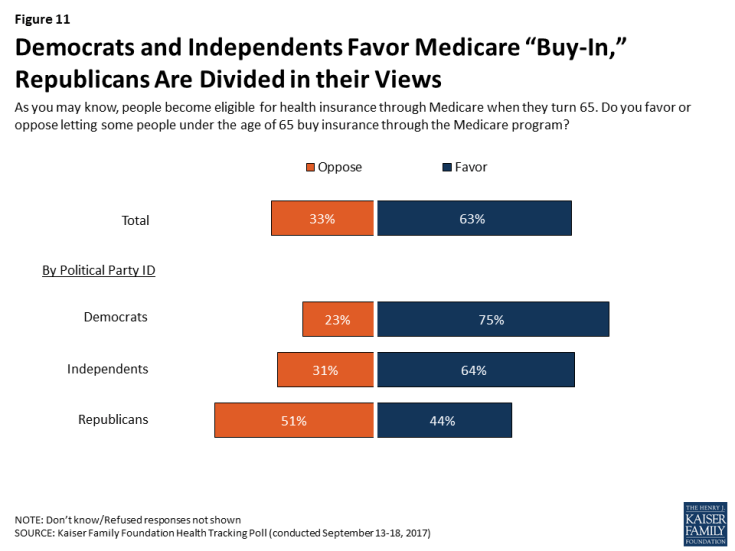
Figure 11: Democrats and Independents Favor Medicare “Buy-In,” Republicans Are Divided in their Views
Single-Payer, Government Run Health Plan
On September 13, 2017, Senator Bernie Sanders announced his “Medicare for All” bill, a single-payer plan in which all Americans would get health insurance from one government-run, national health plan.5 This month’s Kaiser Health Tracking Poll finds that while a slight majority of the public is in favor of a single-payer system, attitudes can be swayed by counter-messages.
There is a strong partisan divide in attitudes toward a national health plan with a majority of Democrats (70 percent) favoring such a plan, while a majority of Republicans (72 percent) oppose it. Independents are also largely in favor of such a plan, with roughly six in ten (59 percent) saying they “favor” it compared to four in ten (39 percent) who say they “oppose” it. This month’s poll findings are similar to the June Kaiser Health Tracking Poll with one notable exception – the share of Republicans who say they “strongly oppose” a national health plan is up 13 percentage points (from 48 percent in June to 61 percent this month).
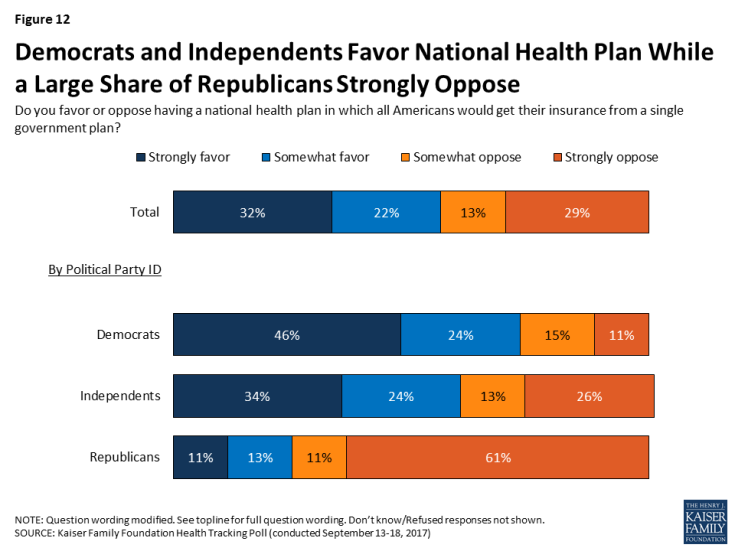
Figure 12: Democrats and Independents Favor National Health Plan While a Large Share of Republicans Strongly Oppose
Americans Have Varied Reasons for Their Opinions Towards Single-Payer
This month’s survey also asked the public to say in their own words the reasons why they either favor or oppose a national health plan. Among those who say they favor a national health plan, one in five (21 percent) say they favor it because “it improves access to health care or health insurance.” This is followed by similar shares who say they favor such a plan because it will “decrease the cost of health care or health insurance” (13 percent) and because it “works in other countries’ (10 percent). Among those who oppose a national health plan, three in ten (28 percent) say it is because they “don’t want the government involved” while a smaller share say it is because of a “lack of choice” (18 percent).
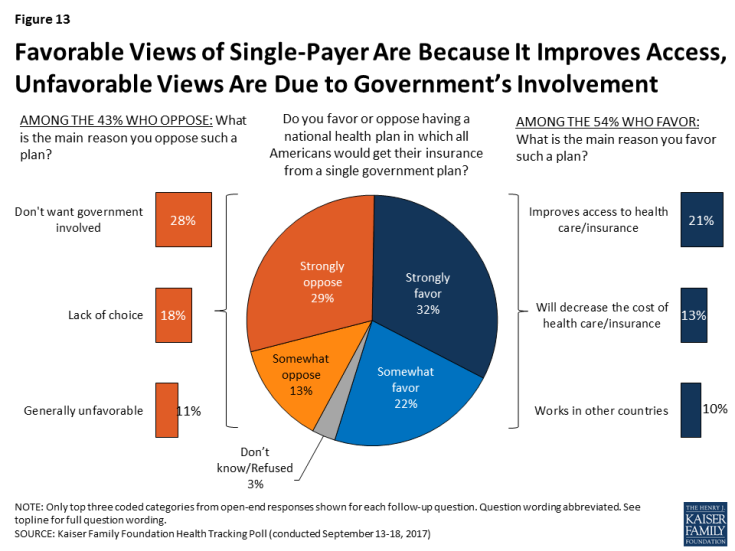
Figure 13: Favorable Views of Single-Payer Are Because It Improves Access, Unfavorable Views Are Due to Government’s Involvement
Attitudes on a National Health Plan May Change After Hearing Counter-Messages
Although a slight majority of the public favors a national health plan, attitudes are malleable when given counter-messages. Among those who initially favor having a national health plan in which all Americans would get their insurance from a single government plan, about four in ten (23 percent of the public overall) say they now oppose it after hearing that opponents say such a plan would require many Americans to pay more in taxes. Similar shares also say they now oppose a national health plan after hearing that it would give the government too much control over health care (18 percent of the public overall) and eliminate the role of employers in health care (17 percent of the public overall). These shifts result in about six in ten of the public opposing a national health plan.
On the other hand, opposition towards a national health plan is also somewhat malleable, with total support growing to as high as seven in ten of the public after some are persuaded with counter-messages. For example, when those who initially oppose a national health plan are told that supporters say such a plan would ensure that all Americans have health insurance, roughly four in ten now say they favor such a plan (16 percent of the public overall). A similar share (14 percent of the public overall) change their mind after hearing that supporters say such a plan would reduce health insurance administrative costs. Slightly fewer (9 percent overall), say they now favor a national health plan after hearing that supporters say such a plan would reduce the role of all private health insurance companies in health care.
Perceived Impact of a National Health Insurance Plan
Despite the significant changes associated with a national health plan, few perceive that such a plan will affect them personally. Nearly half (48 percent) say the quality of their own health care would “stay about the same” and about four in ten say they think the availability of health care treatments, and their choice of doctors and hospitals would “stay about the same” if a national health plan were put into place. On the other hand, smaller shares (less the one-third) say each of these would get “better” or “get worse” if a national health plan was put into place.
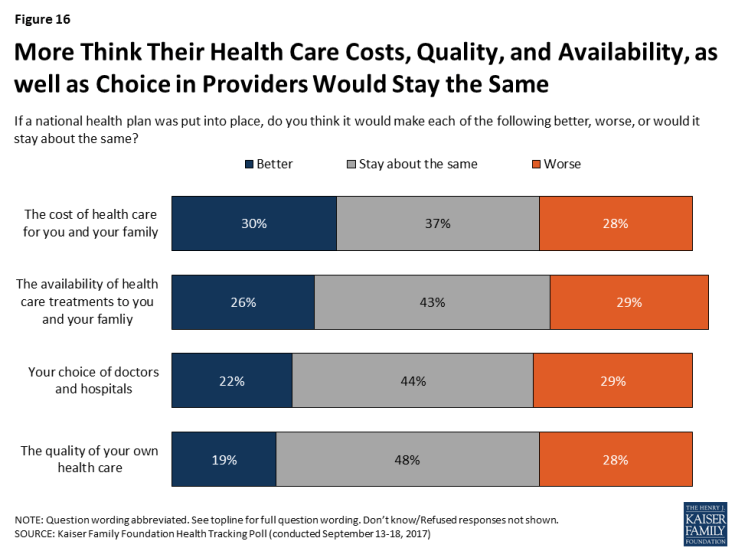
Figure 16: More Think Their Health Care Costs, Quality, and Availability, as well as Choice in Providers Would Stay the Same
These opinions are largely driven by party identification with about half of Republicans saying the cost, quality, and availability of their health care as well as choice of doctors and hospitals would get “worse,” while a larger share of Democrats and independents say these would “stay the same” if a national health plan was put into place than say they would get “worse.”
| Table 2: Larger Shares of Republicans Think Health Care Will Be Made “Worse” Under National Health Plan | ||||
| Percent who say each of the following will be made “worse” if a national health plan was put into place: | Total | Democrats | Independents | Republicans |
| Availability of health care treatments to you and your family | 29% | 16% | 28% | 49% |
| Your choice of doctors and hospitals | 29 | 14 | 28 | 48 |
| Quality of your own health care | 28 | 15 | 26 | 49 |
| The cost of health care for you and your family | 28 | 16 | 25 | 45 |

